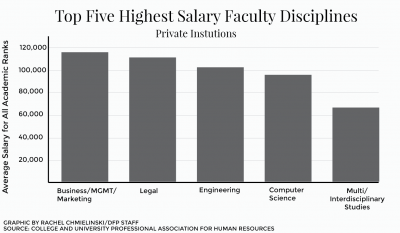
Tenure-track faculty members at higher education institutions remain the highest paid employees, receiving a 2.2 percent increase in median salary in the 2015-16 period. This is the highest salary increase of any academic rank, according to a report released Monday.
The report, conducted by the College and University Professional Association for Human Resources, included survey results from 241,491 full-time faculty members at 743 institutions across the United States in 32 general disciplines and 345 specific disciplines, and compared the results by positions as well as the subject each faculty is teaching or researching.
The report, titled “Overview: 2015-16 Faculty in Higher Education Salary Survey Report,” found that the best-paid disciplines for tenure-track faculty are positions in business, law and engineering fields, whereas pastoral counseling professors, Bible studies professors and linguistic studies instructors are reported to be the lowest paid.
“The data emphasize that institutions are continuing to make clear distinctions in pay by discipline,” CUPA-HR CEO and President Andy Brantley stated in the press release. “It’s also important to note which disciplines are hiring the largest numbers of new faculty.”
Faculty members’ earnings in the “Science Technologies” discipline have the lowest non-tenure-track to tenure-track ratio, with non-tenure-track faculty earning slightly more than half of the tenure-track faculty.
“The discipline that comes closest in equal pay … is ‘Theology and Religious Vocations,’ in which non-tenure-track faculty salaries are 97.5% that of tenure-track faculty salaries,” the release stated. “However, faculty in religious studies are some of the lowest paid in general.”
CUPA-HR Director of Research Jackie Bichsel said they plan on conducting a series of future analyses on the data to further examine what affects the results of the survey.
“We can look at the effects of the recession and cuts to state funding … [and] at correlations with the increase in adjuncts and non-tenure track positions,” Bichsel said.
BU spokesperson Colin Riley said in an email that professors in different fields receive different salaries because the university needs to compete in the job market.
“Difference in salaries reflects the marketplace in hiring for the varied disciplines,” Riley said. “Individuals with law, business and engineering degrees command higher salaries outside of higher education and therefore generally receive the highest salaries as faculty members.”
Jay Halfond, a higher education professor in the Metropolitan College, said that discipline-based salary differences have already been the nature in post-secondary education for some time.
“This often occurs in fields where universities compete with industry and professional firms for faculty talent, especially in law, engineering, computer science and several business fields,” Halfond said. “Not only are schools like BU competing with other universities for great faculty, but [the university is competing] with the temptation to earn far more in the ‘real world.’”
Although differences in salary often causes “envy from other professors in fields with different competitive markets,” sometimes the university makes its decision based on the faculty’s ability to raise external funding and teaching load, Halfond explained.
Several students said they were not surprised by the results of the report, and most understood why different disciplines result in different salaries.
Madison Berman, a freshman in the Questrom School of Business, said she disagreed with the idea of paying professors differently based on their fields of expertise.
“It’s unfair to the professors who are being paid less for the same hours and workload,” Berman said.
Meghan Volcy, a freshman in the College of Arts and Sciences, said while she understands why universities choose this common practice, she is concerned how the difference in professors’ salaries can affect values people place on certain disciplines.
“Certain majors and career fields are more in demand than others,” Volcy said. “[However,] it decreases the social importance of certain positions, plays a heavy part in a student’s decision of what they pursue in college … and at the end of the day, makes people feel inferior for doing what they love to do.”
Grace Yang, a freshman in College of General Studies, said she believes this practice of determining faculty income across higher institutions is justifiable only to a certain extent.
“In certain fields — for example, engineering — kids have to do more work as opposed to others,” Yang said. “There should not be an income gap — one professor making six figures while another’s just getting by.”


















































































































